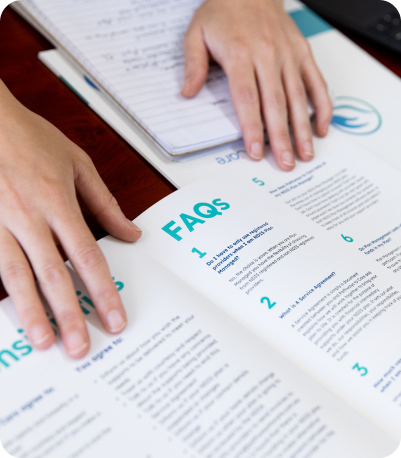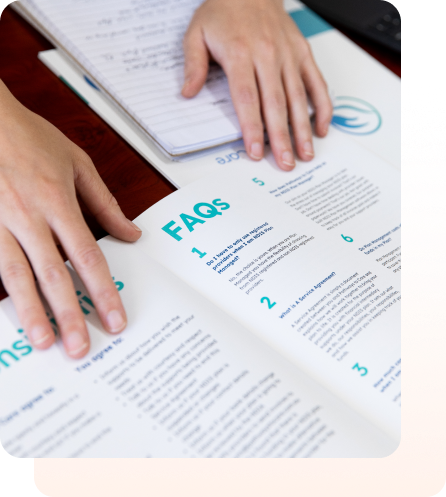
As an insurance scheme, the NDIS means that those who are born with or acquire a permanent and significant disability will have access to the reasonable and necessary supports they need to live an ordinary life. This includes eligible people with psychosocial disability, who have a psychiatric condition that is permanent, or likely to be permanent.
To access the NDIS you must pass the eligibility criteria and then from there complete the necessary forms.
To access the NDIS you have to fit the eligibility criteria. Visit the official NDIS Eligibility checklist to see if you qualify for the NDIS. If you do, then proceed with making an access request. This can be done by calling 1800 800 110 or submitting the request form. There are two sections of the form. Section one is filled out by the Participant, Nominee or Representative. Section two is filled out by treating health professionals, for example, a doctor, a psychiatrist, a pediatrician, allied health professionals, etc. The form is then submitted, via email or via post. The NDIS then have 21 days to respond to your request.
The NDIS helps people with disability to access mainstream services and disability supports like the health system and education systems. It helps with access to community services and disability supports like sports clubs, community groups and charities. It helps with maintaining informal support for example the help people get from their family and friends. This is support people don't pay for and is generally part of most people's lives. It also assists to get reasonable and necessary funded disability supports related to their disability and needed for them to live an ordinary life.
Funds go towards supports to allow participants to live independent and full lives.
Daily personal activities, and transport to enable participation in the community, through social, economic and daily life activities. Workplace help to allow a participant to successfully get or keep employment in the open or supported labour market. Therapeutic support, including behaviour support. Help with household tasks to allow the participant to maintain their home environment. Help to a participant by skilled personnel in aids or equipment assessment, set up and training. Home modification design and construction, mobility equipment, and vehicle modifications.
Services that are covered by other government agencies or services that are not related a participant's disability are not funded by the NDIS
There are some kinds of supports that will not be funded or provided by the NDIS. The NDIS cannot fund support that is the responsibility of another government system or community service or not related to a person's disability. They also cannot support costs that relate to day-to-day living that are not related to a participant's support needs. The NDIS will also not fund an item/support that is likely to cause harm to the participant or pose a risk to others.

National Disability Insurance Agency. This is the government agency that oversees the running and implementation of the NDIS. They are responsible for determining who is eligible for the NDIS and who isn't. They hold all funds contributed by commonwealth, state and territory governments to manage the scheme's funds, and approve payments of a participant's plan.
These are local organisations that work in partnership with the NDIA to help participants over 18, their families and carers, access the NDIS. Once a person is an approved participant, LACs will help them write, manage and understand their plans as well as assist with the connect ionto supports and mainstream services in the community. The LAC organisations differ depending on what area you are in Australia.
Early Childhood Early Intervention Partners assist families and carers with children under the age of 9, to access and, once an approved participant, understand and utilise their plan. They have experience working with children with developmental delay and disability. Early Childhood Early Intervention Partners will differ depending on where you are in Australia.
When a participant's circumstances and needs are complex an NDIA Planner may take the role, over from a Local Area Coordinator, to develop and monitor their plan.
Is a person who delivers one of three levels of Support Coordination:
If you need additional help to understand your plan, engage with providers and other government agencies, Support Coordination might be funded in your plan. A Support Coordinator works with you to ensure a mix of supports is used to increase capacity, help maintain relationships, manage service delivery tasks, live more independently and be included in your community.
You can choose the way your funding is managed, with one of the options being Plan Managed. A Plan Manager is a service provider that supports you to manage your funding by paying your provider invoices. Being Plan Managed allows you to use registered and non-registered providers. Your Plan Manager will support you to understand your funding, and how you can use it. They also provide you with monthly statements and other digital budgeting tools to get better insight into your spending. Additional funding is placed into your plan for this service and you can choose to switch to Plan Management from Self-Management at any time.
The NDIS was created to revolve around its participants, with its main aim of giving those with a disability the chance to live normal, fulfilling lives. Participants have met the access requirements of the scheme and will be supported for as long as they need in their lifetime. Not all participants can make decisions on their own, so a nominee may be appointed to assist.

The four categories of NDIS Support Budgets that you can have funded in your NDIS Plan are: Core, Capacity, Capital and Recurring. Let's go into detail for each of the support budgets and what is included.
The Core Supports budget is made up of six categories. It is the most flexible budget (excluding Home and Living, and YPIRAC). This means you can move your funding around based on where you need it most (unless funding is stated - then it can not be moved).
Assistance with Daily Life For example, yard maintenance, house cleaning, support workers for - showering, dressing and meal assistance.
Consumables For example, continence products, low-cost assistive products, on slip mats, adaptive cutlery etc.
Home and Living – stated For example, supports to help you live as independently as possible. Supported Independent Living (SIL), Medium Term Accommodation (MTA), Independent Living Option (ILO), and Assistance with daily life tasks provided in a residential aged care facility.
Assistance with Social & Community Participation For example, support worker to assist you to attend social and community activities, events and programs.
Transport Support that helps you travel to work, or other places that will help you pursue your goals. Note - Transport funding can be paid to everyone differently.
Young People Living in Residential Aged Care (YPIRAC) Funding for some of your fees and charges if you are a younger person in residential aged care (cross billing).
The Capacity Support Budget helps build your independence and skills to help pursue your goals. Your Capacity Budget is not flexible and must be used for its specific purpose.
Support Coordination & Psychosocial Recovery Coaching A fixed amount for a Support Coordinator or Psychosocial Recovery Coach to help you understand and use your plan. Coordinating supports and providers for you and providing updates to the NDIA.
Improved Living Arrangements Support to help you find and maintain an appropriate place to live. For example, a support worker who helps you attend inspections or complete rental applications.
Increased Social & Community Participation Development and training to increase your skills so you can participate in community, social and recreational activities. For example, group and centred based activities.
Finding & Keeping a Job This may include employment-related support, training and assessments that help you find and keep a job. For example, supports that provide a participant with assistance to prepare for, find and retain a job in the participant's employment setting of choice.
Relationships This support will help you develop positive social skills and interact with others. For example, support to partake in social activities, behaviour therapies.
Health & Wellbeing Supports that are directly related to managing the impact of your disability on your health. For example, dietitian, personal trainer, exercise physiologist.
Lifelong Learning Support, training and advice to help you move from school to further education, such as University or TAFE. For example, support worker to assist in going to TAFE or university, school leaver employment preparation, assistance to transition to employment.
Choice and Control Plan Management to help you manage your funding, pay for your supports and services and provide guidance on understanding and utilising your funding.
Improved Daily Living Skills Assessments, training or therapy to help increase your skills, independence and community participation. For example, occupational therapy, physiotherapy, speech therapy, psychology, art therapy, music therapy (the NDIS will only pay for evidence-based therapy).
Behaviour Support Supports that are provided by professionals with specialist skills in positive behaviour support. For example, behaviour Support Practitioner to assist in developing a behaviour support plan.
Capital Supports include higher cost pieces of assistive technology, equipment or vehicle modifications. This funding budget is not flexible, funding must be used for its specific purpose. Quotes can be required.
Assistive Technologies For example, mobility & personal care items, prosthetics, high powered wheelchairs, communication devices, vehicle modifications.
Special Disability Accommodation (SDA) For example, a specially designed house for people with extreme functional impairment or very high support needs.
Assistive Technology Repairs and Rental for example, supports to repair and maintain assistive technology, and short-term rental and trial of assistive technology.
Home Modifications for example handrails, ramp installation etc.
Recurring Supports is paid by the NDIA on a regular basis, so you don’t need to claim for these. This funding is not included anywhere else in your budget.
Transport Recurring For example, this funding is for your everyday transport needs when you cannot use public transport or travel yourself. This could include taxis or private transport.

NDIS participants must select one of the three types of funding management options. Your planning meeting is where you choose how your funding will be managed but if you change your mind or want to switch then don't worry, you can request a change at any time. The Pathways to Care team can provide assistance.
A benefit of Plan Managing your NDIS funding is that you have the flexibility to choose from both NDIS-registered and non-registered service providers.
You also have a Plan Manager taking care of the administrative tasks involved when you have an NDIS plan, like paying all of your NDIS-related bills, and following up with providers if there are errors in invoicing. A Plan Manager will also help you to stay across your budget through monthly statements, alerts if you are at risk of overspending, as well as being available to call upon if you have any questions and need guidance.
You must use registered NDIS providers and the providers claim directly from the NDIA. A benefit of being NDIA managed is that NDIA arranges all your funds and helps with service agreements.
A benefit of Self Managing your NDIS funding is that you have the flexibility to choose from both NDIS-registered and non-registered service providers for your supports and services. However, it is your responsibility to submit and manage your claims with the NDIS and keep records of all your receipts and paperwork for 5 years.

Our useful table of considerations below will help you identify what style of funding management will be the best fit for your personal situation.
| WHAT TO TAKE INTO CONSIDERATION |
SELF MANAGED |
PLAN MANAGED |
NDIA MANAGED |
| Do I have someone helping with provider payments? | NO | YES | YES |
| Do I have someone keeping a record of all my payments? | NO | YES | YES |
| Can I use NDIS registered providers? | YES | YES | YES |
| Can I use unregistered providers? | YES | YES | NO |
| Is funding added into my plan for this management type? | YES | YES | NO |
| Does someone help with my budgeting? | NO | YES | YES |
| Can I view my plan balances? | YES | YES | YES |
| Do I receive a monthly statement? | NO | YES | NO |
| Can I view all invoices that have been paid? | IF you have kept records | YES | YES |